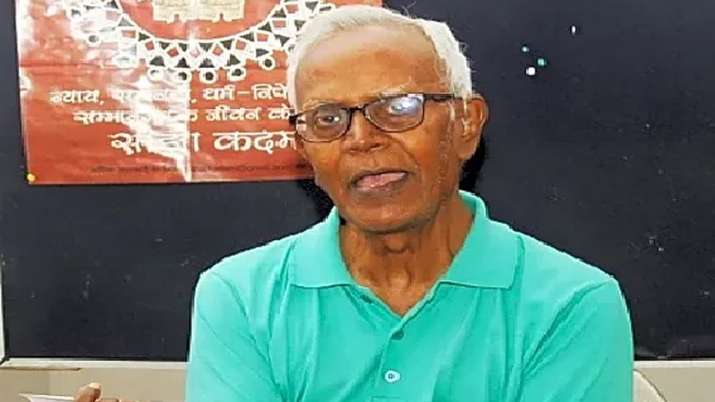
file/PTI
India on Tuesday rejected mounting international criticism over the death of rights activist Father Stan Swamy, saying due process of law was followed in his case and authorities act against violations of the law and legitimate exercise of rights. do not stop. Stating that India is committed to the promotion and protection of the human rights of all its citizens, the Ministry of External Affairs (MEA) said the country’s democratic polity is complemented by an independent judiciary and a series of national and state level human rights commissions.
Eighty-four-year-old Stan Swamy, who was arrested last year under the Unlawful Activities (Prevention) Act in the Elgar Parishad case, died at a Mumbai hospital on Monday.
India’s statement came after UN human rights chief Michelle Bachelet and US and European Union (EU) human rights officials expressed concern over the death of a Jesuit priest and rights activist.
Noting that Father Stan Swamy was arrested and detained by the National Investigation Agency after due process under law, the ministry said that due to the specific nature of the charges against him, his bail applications were rejected by the courts. .
Foreign Ministry spokesman Arindam Bagchi said, “Authorities in India act against violation of law and not against legitimate exercise of rights. All such actions are strictly in accordance with the law.”
His remarks came in response to media queries regarding reactions to Stan Swamy’s demise.
Bagchi said that in view of the ill health of Father Stan Swamy, the Bombay High Court had allowed his treatment at a private hospital, where he was getting all possible medical treatment from May 28.
The Ministry of External Affairs spokesperson said Swamy’s health and medical treatment was being closely monitored by the courts and he passed away on July 5 following medical complications.
“India’s democratic and constitutional politics is complemented by an independent judiciary, a series of national and state-level human rights commissions that monitor violations, an independent media and a vibrant and assertive civil society,” Bagchi said.
“India is committed to promoting and protecting the human rights of all its citizens,” he said.
Earlier, the UN body on human rights said it was “deeply saddened and disturbed” by the activist’s death in pre-trial custody.
The High Commissioner for the UN Human Rights Bachelet and independent UN experts have taken up the cases of Swamy and 15 other human rights defenders with the Indian government over the past three years and urged their release from detention.
“We are deeply saddened and disturbed by the death of 84-year-old Father Stan Swamy, a human rights defender and Jesuit priest, in Mumbai, following his arrest in October 2020 under India’s Unlawful Activities (Prevention) Act,” said Liz Throsell, of the United Nations High Commissioner for Human Rights. spokesman said.
“Father Stan has been held in pre-trial custody without bail since his arrest on charges of terrorism-related offenses in connection with the pre-2018 demonstrations,” she said in a statement.
“In light of the continuing, dire impact of the COVID-19 pandemic, it is all the more necessary that states, including India, release every person detained without sufficient legal grounds to express only critical or dissenting views.” Including those detained. Be in line with the call of the Indian judiciary to decongest the prisons.”
Throsell said the High Commissioner called upon the Indian government to ensure that no one is detained for exercising their fundamental rights of freedom of expression and peaceful assembly.
UN Special Envoy on Human Rights Defenders Mary Lawler called Swamy’s death “devastating” and claimed she was imprisoned on “false charges of terrorism”.
“Today’s news from India is devastating. Father Stan Swamy, a human rights defender and Jesuit priest, has died in custody, nine months after his arrest on false charges of terrorism. It is unforgivable for human rights defenders to go to prison,” Lawler said.
Eamon Gilmore, the EU’s special representative for human rights, also expressed concern.
.